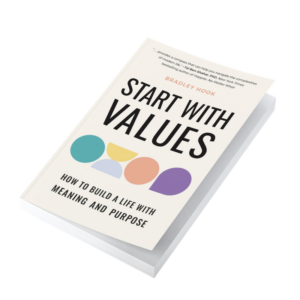I’ve been thinking a lot about habits. Not just habits but how they tie into what really matters to us – our values. It’s not just about doing something because it’s good for us. It’s about doing something because it resonates with who we are at our core.
James Clear talks about identity-based habits in his book “Atomic Habits.” It’s an excellent approach, but I want to tweak that idea. What if we start with a value, not an identity? Identity feels like who we’re supposed to be, right? It’s aspirational — “I am a fit person” or “I am a calm person.” However, if you’re not that person (yet), simply stating it can feel a little phony.
Values, though, they’re the deep-rooted guiding forces. They’re connected to our why. When we’re not aligning behavior with values, we feel stress. When we do align behavior with values we feel ease, perhaps even joy.
So, let’s think about values first, then habits, because a blanket of habits wrapped around core values will lead to fulfillment. Research by the Resilience Institute shows that fulfillment is the most important factor supporting human resilience and well-being. So we need to secure more of it by taking tiny steps that matter.
The power of starting small
Imagine you value health – not because you want to be “a healthy person” per se, but because you genuinely cherish the vitality and the life experiences it brings. To implement this change, you start small. And I mean really small. Like stretching for 1 minute after brushing your teeth. This isn’t overwhelming and can be completed with minimal inner dialog or resistance. The minuscule habit sneaks past your brain’s ‘change resistance’ security system (called homeostasis) without triggering the “fight-flight” response you may experience if you had committed to going to a one-hour yoga class in the morning. You’re making changes that don’t set off alarms.
Values motivate us
Why do values help so much in this? Because they’re powerful motivators. They speak to something deeper within us, not just surface-level desires or societal pressures. When you align your habits with your values, it’s not just about ticking a box. You’re satisfying intrinsic motivators with action that gives you satisfaction and a sense of momentum.
And thats the thing about these micro-habits, rooted in values, they feel good. You’re not just doing them to reach an external goal. You’re doing them because they’re meaningful. Through practice, you reinforce the habit, feel even better each time, and then you become a healthy, calm, or fit person as an output, rather than a starting point.
37x improvement in a year
Don’t underestimate the power of these small changes. They’re like compound interest for your personal growth. Start with a tiny habit, keep at it, and over time, you’ll have traveled miles from where you started. Every small step makes the next one just a little bit easier. James Clear says that you’ll be 37 times better by the end of a year, when you improve just 1% each day. And 1% of your day is… 9.7 minutes of your waking hours. Can you dedicate 9.7 minutes to yourself today and every day?
The habit formation process
Alright, let’s dive into the nitty-gritty of habit formation.
First off, pick your habit. But here’s the twist: it’s not just any habit. This habit needs to be tied to one of your core values. Say, you value creativity. Your habit? Maybe it’s writing for 10 minutes a day. The key? It’s gotta resonate with what matters to you.
Now, let’s talk baby steps. You want to write for 10 minutes a day? Start with two minutes. Sounds too easy? That’s the point. You’re tricking your brain into thinking, “Hey, this isn’t so hard.” Before you know it, two minutes becomes five, then ten. You’re in the zone before your brain even knows what hit it.
Consistency over intensity – that’s your mantra. Don’t go all out only to burn out. It’s better to write for two minutes every day than to write for an hour and then not touch your pen for a week. Trust me, it’s the small, regular actions that lead to big changes.
Now, here’s a bit we often skip: celebrate your wins, no matter how tiny. Wrote for two minutes? Pat yourself on the back. It’s crucial. This little celebration releases a hit of dopamine, and your brain starts thinking, “I like this. Let’s do it again.” It’s basic brain chemistry working in your favor.
Then there’s the environment. Set yourself up for success. Keep your writing tools in plain sight. Remove distractions. Make it easier to do your habit than not to do it. Remember, you’re not just forming a habit; you’re setting the stage for it.
But hey, you’re human. You’ll slip up. When that happens, no self-beating. Acknowledge it, learn from it, and get back on track. Resilience in habit formation? That’s gold.
Lastly, be patient. These things take time. You’re planting a seed, not microwaving a meal. Give it the time and care it needs to grow.
That’s it. That’s the real-talk guide to forming habits. Start small, stay consistent, celebrate wins, prep your environment, bounce back from slips, and be patient. Do this, and watch as your tiny habits snowball into life-changing routines. You’ve got this.


